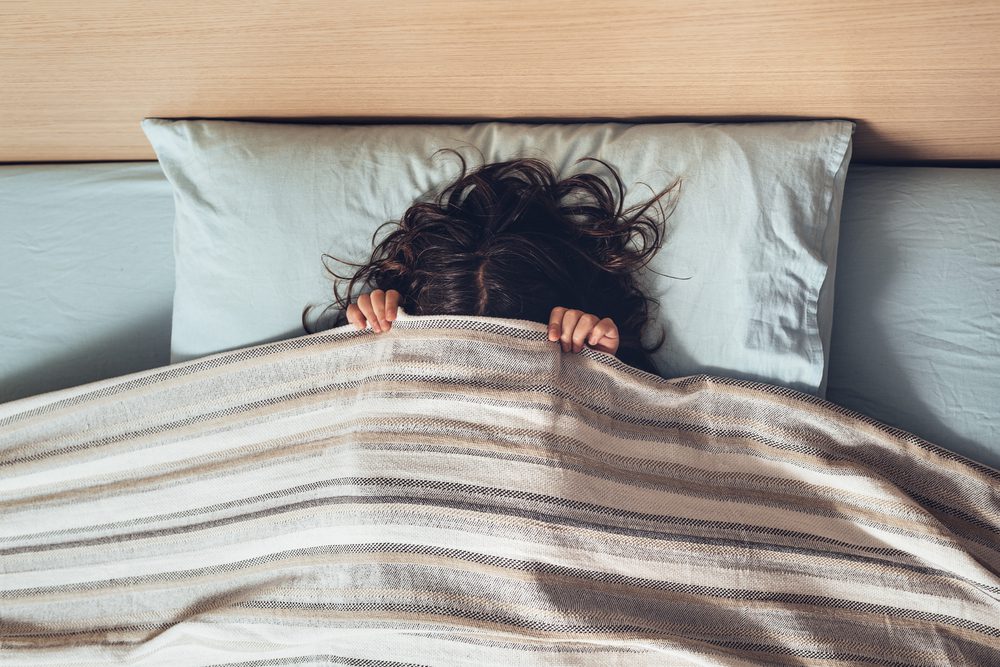Sexsomnia is a type of parasomnia. Parasomnias are sleep disorders characterized by unwanted sleep behaviors, movements, or emotions. Sexsomnia causes individuals to perform sexual actions, such as masturbating or initiating intercourse, during sleep.
Experts aren’t sure how many people have sexsomnia. One sleep disorder center found that 8% of their patients demonstrated sexsomnia symptoms. However, people may not know that they have the condition unless someone else notices their behavior.
Dealing with sexsomnia can be concerning for those who experience it. Fortunately, it is a treatable condition. For many individuals with sexsomnia, medication and lifestyle changes help stop unwanted nighttime behaviors.
What Is Sexsomnia?
Sexsomnia is a kind of sleep disorder that causes a person to unknowingly engage in sexual behaviors while not fully awake.
Most sexsomnia behaviors are categorized as confusional arousals. During a confusional arousal, a sleeper appears to be awake but does not respond to their environment or leave their bed. If they do leave bed, the incident is categorized as sleepwalking.
Both confusional arousals and sleepwalking episodes occur when someone only partially wakes up from deep sleep, also called slow wave or stage 3 sleep. People who are in stage 3 sleep are difficult to awaken, which may be why many parasomnias occur during this phase.
Confusional arousals, including sexomnia episodes, generally last for less than 15 minutes. Most people with sexsomnia are not aware of their actions in the moment and do not remember the incident after they wake up.
What Are the Symptoms of Sexsomnia?
The symptoms of sexsomnia differ among individuals who are affected. People who experience sexsomnia may engage in certain sexual behaviors unknowingly while partially asleep, including:
- Masturbating
- Initiating intercourse with a bed partner
- Making loud sexual noises
Because a person with sexsomnia engages in these behaviors unknowingly, they may impose a sexual advance on another person inappropriately or without their consent. People experiencing a sexsomnia episode cannot recognize other people and do not remember their actions when they fully awaken.
What Causes Sexsomnia?
Experts are not entirely sure what causes sexsomnia. Sexsomnia seems to be most common in men and may have a genetic component. Many believe that a combination of factors can lead to sexsomnia and other parasomnias.
Obstructive Sleep Apnea
Sexsomnia may be linked to another sleep disorder called obstructive sleep apnea (OSA). OSA occurs when a person’s airway becomes blocked as they sleep, causing them to stop breathing for brief periods. People with OSA tend to experience a brief arousal when they start breathing again after a pause, which may trigger a confusional arousal.
People who have both OSA and sexsomnia may find that treating OSA helps reduce or stop their sexsomnia-related behaviors.
Physical and Environmental Triggers
In people prone to experiencing sexsomnia, certain physical and environmental factors can trigger episodes or make symptoms worse, such as:
- Emotional stress
- Sleep deprivation
- Menstruation
- A full bladder
- Fever
- Certain medications
An important part of managing sexsomnia for many people is to be aware of triggering factors and to avoid them if possible.
How Is Sexsomnia Diagnosed?
Doctors typically diagnose sexsomnia by reviewing your medical history and, if necessary, performing sleep tests. It may feel embarrassing or uncomfortable to discuss your symptoms with a health care provider. However, it’s important to be open with your doctor so that they can develop an appropriate treatment plan.
The doctor may ask you how often your episodes occur, when you began experiencing symptoms, and if you have been experiencing symptoms of other sleep disorders. They may also ask if you have a family history of parasomnia, like sleepwalking.
Because it can be hard to remember the details of an episode, your bed partner may need to help provide information. It may also be helpful to keep a journal of your experiences and symptoms.
Since sexsomnia can cause a person to behave in potentially harmful or illegal ways, seeking medical help is critical if you think you might be experiencing it. Diagnosing sexsomnia can help your doctor develop a treatment plan and suggest lifestyle changes to prevent episodes and promote safety.
Polysomnography
If your doctor suspects that you have another sleep disorder in addition to sexsomnia, like sleep apnea, they might recommend polysomnography (PSG). Also known as a sleep study, a PSG involves collecting multiple measurements of physical functions while you sleep.
Sleep studies usually take place overnight at a sleep center. During a PSG, a technician attaches electrodes to your skin. While you sleep, devices measure:
- Heart rate
- Breathing
- Brain waves
- Body position and movements
- Blood oxygen levels
- How long it takes you to fall asleep
- When you enter certain sleep stages
When the PSG is complete, a specialist will review the results and work with you and your primary health care provider to develop a treatment plan.
Treating Sexsomnia
Treatment plans for sexsomnia typically depend on what is triggering the condition. A doctor also considers any other sleep disorders and medical history in the development of a treatment plan.
Sometimes, sexsomnia symptoms improve after a person begins treatment for another sleep disorder. Other times, addressing stress and anxiety might be enough to prevent sexsomnia episodes.
Changes in Medication
Certain medications can trigger confusional arousal episodes such as sexsomnia. These include:
- Antipsychotics
- Anticholinergics
- Sedatives
If you begin experiencing sexsomnia symptoms after starting a new medication, let your doctor know immediately. It’s essential to talk with a doctor before stopping any prescribed medication.
Limited research has been done on drug therapy for sexsomnia. However, some evidence suggests that certain medications might be helpful to try.
Avoid Triggers
If you experience sexsomnia, work with your health care provider to understand what triggers your episodes, and do your best to avoid these things. Certain modifications to your home, schedule, or lifestyle may help.
- Get enough rest: Sleep deprivation can make sexsomnia worse. Make sleep a priority, and go to sleep and wake up at the same time each day. Talk to your doctor if you have trouble falling or staying asleep.
- Eliminate noise and distractions: Sounds and lights in your sleep environment can be disruptive and cause partial awakenings. Silence your phone and keep your bedroom dark and quiet.
- Use the bathroom: A full bladder is a common sexsomnia trigger. Use the bathroom before you go to bed, and avoid drinking too much liquid close to bedtime.
- Reduce stress: Stress disrupts sleep and triggers confusional arousals. Do your best to eliminate unnecessary stressors from your life, and prioritize relaxation before bed. Consider picking up a relaxing hobby, listening to calming music, or meditating.
- Treat other conditions: One sleep disorder often impacts another. Be honest with your health care provider about the symptoms you are experiencing. Let them know if you frequently feel tired during the day, struggle to fall asleep night after night, or snore on a regular basis.
Create a Safe Environment
People who have sexsomnia typically do not leave their beds while they are having an episode. Still, it is important to ensure that the sleeping environment is safe and encourages restful sleep for the individual with sexsomnia and their bed partner.
Living with roommates or family members can be especially challenging if you have sexsomnia. You may want to consider investing in a white noise machine. Not only will white noise prevent others from hearing sounds that come from your room, it can block out potentially triggering sounds from outside of the bedroom.
Some people with sexsomnia also walk in their sleep. If you experience episodes of both sleepwalking and sexsomnia, lock your windows and doors before sleep, and remove potentially dangerous items from your bedroom. Clear clutter from pathways.
Communicate
Talking about sexsomnia can be difficult. However, it is important to communicate openly about the disorder with any housemates and bed partners. Assure them that your behaviors are involuntary, and that you are not aware of your actions while you are having an episode.
If your partner understands the condition, they may be less likely to be surprised or frightened when you have an episode. They may also be able to help monitor your actions, so you’ll have more information to share with your health care provider.
Communicate with your doctor regularly. Let them know if your symptoms change or worsen or if you think a medication may be causing your sexsomnia. If your current treatment plan isn’t working, they can find a better way to help you manage your symptoms.
References
Ask the Sleep Doctor
Have questions about sleep? Submit them here! We use your questions to help us decide topics for future articles, videos, and newsletters. We try to answer as many questions as possible. You can also send us an email. Please note, we cannot provide specific medical advice, and always recommend you contact your doctor for any medical matters.







